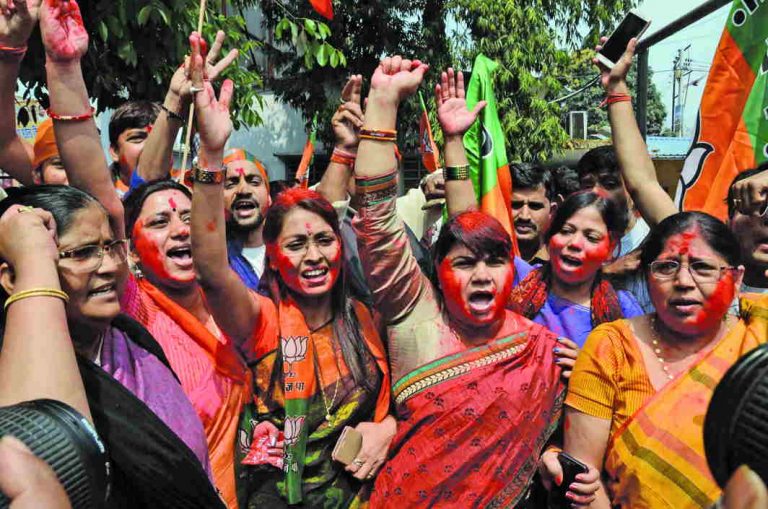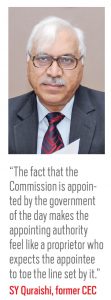
The apex court has sought a law for the appointment of Election Commissioners as the present system is arbitrary and non-transparent and can’t be left in the hands of the Executive
~By MG Devasahayam
The constitution mandates the Election Commission with the superintendence, direction and control of the preparation of the electoral rolls for, and the conduct of, all elections to parliament, state legislatures as well as the President and the Vice-President. Article 324 (2) of the constitution provides that appointments of the Chief Election Commissioner (CEC) and Election Commissioners (EC) will be made subject to the provisions of an enabling law made by parliament.
The President appoints the CEC and ECs. They have a tenure of six years or up to the age of 65 years, whichever is earlier. They enjoy the same status and receive salary and perks as judges of the Supreme Court. The CEC can be removed from office only through impeachment by parliament.
In the Mohinder Singh Gill vs Chief Election Commissioner (1978. 2 SCR-272) case, the Supreme Court ruled that “Article 324 is a reservoir of power to act for the avowed purpose of pushing forward a free and fair election with expedition…. The Commission shall be responsible for the rule of law, act bona fide and be amenable to the norms of natural justice in so for as conformance to such canons can reasonably and realistically be required of it as fair play-in-action in a most important area of constitutional order, viz, elections.” In a catena of cases, the apex court has observed that fair and free elections are a basic feature of the constitution.
REWARDING FAVOURITES
Such is the status, role and power of the Election Commission. Yet, till date, there is no enabling law to appoint the Commissioners and this is being done through an arbitrary, non-transparent, executive process as if rewarding a favourite with a post-retirement sinecure! It has taken the Supreme Court to point this out, adding that leaving the appointment wholly in the hands of the political executive is not a sound basis for preserving the independence of the Election Commission.
Claims of successive CECs notwithstanding, this flawed process of appointment has cast shadows over the “independence and fairness” of the Election Commission. This is of great concern because due to the fast-eroding integrity of the electoral process, India’s democracy is facing serious decay. The all-pervading electoral corruption is destroying the dignity of our democracy.
There are three ways in which this venality could be combated: (a) Self-correction by political parties, which is futile to expect from those who consider themselves private entities rather than public bodies and even refuse to come under the RTI Act. (b) Same with reforms by the government which are controlled by these very political parties. (c) Election Commission enforcing its constitutional mandates and extant laws without fear or favour.
Among the above, option (c) is the most practical and doable since Article 324 is a plenary provision vesting the whole responsibility for free and fair elections on the Commission. Besides, several SC rulings have empowered it to operate in areas left unoccupied by the Representation of People Act and Rules made thereof.
ELECTORAL INDEPENDENCE
It is, therefore, imperative on the part of the EC to ensure electoral integrity by all means and not remain tied to the apron-strings of the government. Because of the flawed appointment system, Election Commissioners owe their high position to politicians in power. Therefore, in the conduct of elections, the EC does not consult the people, the real stakeholders who give power to these politicians. Instead, it panders to the political parties, who are only interested in grabbing power by fair or foul means. Elections have become a mere tool to facilitate this.
 The EC is not placed in such an exalted position by “We, the People” to bring political parties to power and allow them to do whatever they want. It is there on behalf of the people to sustain democracy and make it vibrant. It must be noted that the EC is not a subordinate entity of the government, but an independent constitutional authority.
The EC is not placed in such an exalted position by “We, the People” to bring political parties to power and allow them to do whatever they want. It is there on behalf of the people to sustain democracy and make it vibrant. It must be noted that the EC is not a subordinate entity of the government, but an independent constitutional authority.
Some former CECs have been flagging the issue of appointment of ECs as a key to the independence of the Election Commission. One of them, SY Quraishi, called a spade a spade: “The fact that the Commission is appointed by the government of the day makes the appointing authority feel like a proprietor who expects the appointee to toe the line set by it…. It is ironic that perhaps the most powerful Election Commission in the world has the most flawed system of appointment. Nowhere in the world, does the government of the day unilaterally appoint the Election Commissioner. It is always by a collegium or even full parliamentary scrutiny/interview…”
COLLEGIUM SYSTEM
Appointments in statutory bodies like the Central Vigilance Commission and the Central Information Commission are made through the collegium system. The Supreme Court has ordered this system even for the appointment of Director, CBI, who is a departmental head. In the event, not adopting a collegium-led selection and appointment system for the constitutional post of ECs cannot be countenanced. Once such a process is adopted, the two commissioners should be given protection from removal, except through impeachment, as provided by the constitution for the CEC, the sole member at the time of inception.
Such an independent and credible EC should have the power to punish political parties (including de-registration) who commit a major violation of their oath or indulge in wilful disobedience of the lawful orders like non-submission of accounts and audit reports, not conducting internal party elections, persistent violation of the model code, etc.
The EC should also regulate the entire funding of political parties and their expenses during elections. The Commission should assume powers to allot different symbols to political parties for different elections. This will provide a level playing field, which is the essence of free and fair elections.
All these are not possible through patch-work measures or reforms. What is needed is a fresh Representation of People Act incorporating all these since the 1951 and 1952 legislations have outlived their utility and purpose. Sooner this is done, the better!
—The writer is Convener, Forum for Electoral Integrity

